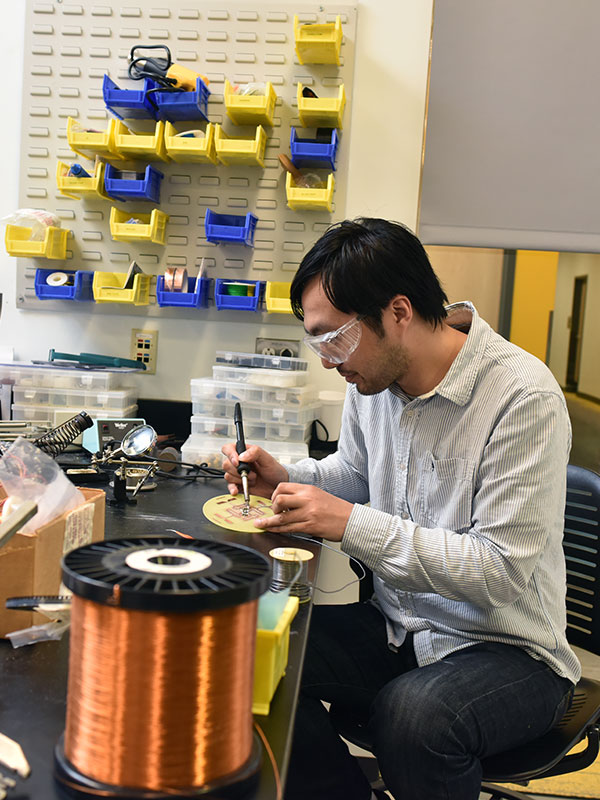Master of Science in Electrical Engineering

The graduate program in electrical engineering prepares professionals for applying deepened skillsets and advanced knowledge that will further their career. Students emerge as professionals ready to take on the rapid changes in design, construction and use of components, devices, and systems incorporating electronics and magnetism.
An MS in Electrical Engineering allows students to learn and contribute knowledge to this constantly advancing discipline. Electrical engineering has an impact on public welfare and safety, as well as on health and healthcare, the environment, quality of life, transportation, computing and leisure. An electrical engineering master of science degree will empower you explore the frontiers and ideas that seek to address complex issues in the many critical utilities and fields where electrical engineering is in demand. At Drexel you will learn about the forces governing industry, gain a global viewpoint, and build entrepreneurial, teambuilding and managerial abilities needed to advance careers in industry and research or prepare for entry into a PhD program in electrical engineering or a related field.
Delivery
- On-campus, hybrid or online
- Full-time or part-time
- The program will take approximately two years to complete on a full-time basis or can be completed on a part-time basis in 3-4 years.
Areas of Specialization
The MS in electrical engineering allows for a flexible plan of study. You may seek a broad range of technical knowledge, or utilize technical electives to target an area of interest. The following are coursework topical areas offered for technical electives:
- Computer engineering
- Control, robotics and intelligent systems
- Electrophysics, image and signal processing
- Power engineering and energy (available on-campus or online)
- Telecommunications and networking
Curriculum and Requirements
- The master's in electrical engineering requires a total of 45 credits; 21 credits of core coursework in electrical engineering; 15 credits of electives. The remaining 9 credits can be completed through a coursework only, non-thesis option of independent study, or other additional concentration electives, or with 9 credits of thesis research (recommended for those interested in doctoral study). Learn more about the Master’s Thesis option.
Graduate advisors are available to guide your course selection and scheduling of core and elective courses.
Visit the Drexel Catalog for more information and sample study plans for areas of specialization or learn more about our admissions requirements.
Graduate Co-op
This program is eligible for Graduate Co-op — a unique, optional three or six-month work full-time professional experience that alternates with study, available for domestic and international full-time master’s students.
About Drexel Engineering
The Department of Electrical and Computer Engineering (ECE) combines related diverse fields that will develop you into a well-rounded engineer. Drexel students are encouraged to be innovative and imaginative in identifying a problem and analyzing potential approaches in the quest for a solution.

The Electrical and Computer Engineering programs at Drexel offer versatile pathways to the work world. A great diversity of students and specialties is supported by a progressive, flexible curriculum developed by our renowned faculty to address emerging trends and incorporate industry leading technology. Traditional study areas include circuits and electronics, telecommunications, power, and controls with additional areas of study and research including work in audio, optics, robotics, biomedical, and nanotechnology, robotics, self-driving cars, Internet of Things, nanotechnology, cybersecurity, computer chips, and renewable energy technologies.
The focus of our programs is to equip you with the tools for finding sustainable and achievable outcomes to solve for society’s biggest challenges while making them relevant to your career goals.
Philadelphia
The city of Philadelphia is our campus – a diverse urban environment with a variety of social, cultural and learning opportunities that will enrich your educational experience. Philadelphia is also a draw for talented instructors and researchers, meaning you will engage with some of the best minds in engineering and other disciplines. Learn more.
Faculty
Drexel places a high value on industry connections and experience at every level. Teaching faculty in your program are experts with industry experience or are at the forefront of research and teaching.
Research
While not a requirement, all students in the master’s in electrical engineering program are welcome to engage in research as part of their degree or as extra-curricular participation. Full-time master’s degree candidates or those interested in pursuing a PhD are encouraged to base their master’s thesis on some aspect of faculty research.
Current research in the ECE Department is conducted by our world-renowned faculty, funded by the U.S. Departments of Defense, Transportation, Health and Human Services, Commerce and Homeland Security as well as with many notable industry partners.
Visit research and design for more about other research activity at the College of Engineering.
Career Opportunities in Electrical Engineering
Electrical engineering graduate programs prepare you for a career path that could include continuing your education in a PhD program or pursuing advanced research, technical or management positions in industries such as life sciences, electromedical devices, telecommunications, power and energy, manufacturing, security, automation or robotics.
Overall, employees with graduate degrees can earn up to 28 percent more than bachelor’s degree holders over the course of their career. The outlook for electrical engineering jobs is good, with demand for employment expected to grow 7% through 2034, much faster than average for the overall projections for all occupations, according to the Bureau of Labor Statistics. As reported by payscale.com electrical engineers with master’s degrees can earn 10% or more per year more than those with only a bachelor’s degree.
Apply Now Graduate Admissions Department Page